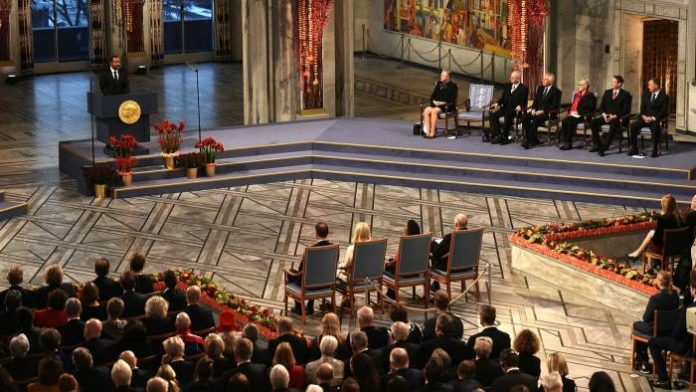The Ethiopian prime minister Abiy Ahmed may have been given the award too soon.
You could call it the curse of the Nobel Peace Prize. Barack Obama was awarded the honour in 2009, just nine months into his presidency and before his grandiloquent plans to bring peace to the Middle East turned to verbiage.
Aung San Suu Kyi, now de facto leader of Myanmar, won it back in 1991 when she was under house arrest and almost universally acknowledged as a defender of freedom and democracy. Later she revealed herself to be a steely pragmatist and Burmese nationalist with no discernible will to stop the persecution of the Rohingya Muslim minority.
Now it is the turn of Abiy Ahmed — the Ethiopian prime minister who won the prize last year — to come under awkward scrutiny. Mr Abiy won the Nobel committee’s admiration during his lightning first few months in office in 2018, when he released political prisoners, opened up the media and made peace with Eritrea. Now, after months of violence and escalating ethnic tension, he has unleashed Ethiopia’s army on the rebellious northern region of Tigray in a show of military might even some of his supporters struggle to defend.
In all three cases, the Nobel committee could be accused of jumping the gun. Aung San Suu Kyi was honoured after she had given a few rousing speeches in favour of democracy, but long before she was tested with power. Mr Abiy and Mr Obama won for the promise of peace, but before their inspiring rhetoric had been properly put into practice.
Of course, actually wielding power need not be a condition for winning the peace prize. Liu Xiaobo, the Chinese dissident and human rights activist, was a worthy 2010 winner. He died in prison in 2017, a victim of the system he tried to change. It is irrelevant what kind of leader he might have become in the far-fetched scenario of his achieving office — something to which he never aspired.
Aung San Suu Kyi and Mr Abiy, however, did seek power. When the daughter of Burma’s most famous nationalist achieved it, the western fairytale vision of her ruling as liberal democrat crumbled. “In retrospect, we knew too little of Myanmar and its complex narratives of ethnic rivalries, deepened by poverty and manipulated over decades by military rulers,” wrote Fergal Keane, a BBC journalist, who had first come under her spell in the mid-1990s.
Substitute Ethiopia for Myanmar and you have a pretty good description of outsiders’ flawed understanding of the country in the Horn of Africa. Never fully subjugated by the west, Ethiopia is more like an imperial power in its own right. Many of its citizens hold a grudge against colonial indignities meted out by northern highlanders who have dominated its history.
People had hoped that Mr Abiy, whose Oromo ethnic group is Ethiopia’s largest, could soothe these tensions. It has not worked out that way. “He came to power to stabilise ethno-nationalism, but he has lifted the lid on a much more serious problem which he is now desperately trying to contain,” says Rashid Abdi, an expert on the region. By sidelining the Tigrayans, who had been running Ethiopia quite successfully for 27 years, Mr Abiy has antagonised a region with a distinct language, culture and history. He has accused the Tigray government of defying central authority by holding elections, organising militia and attacking federal troops, leaving him no choice, he said, but to restore law and order.
To western ears, Mr Abiy’s vision of medemer, an Amharic word connoting strength through diversity, once sounded attractive. But to many Ethiopians, it has been an excuse to concentrate power in the centre. There are “no angels” in this stand-off, as one keen Ethiopian former supporter of Mr Abiy points out. Yet, in office, the PM has revealed leadership traits the Nobel committee might now wish it had known about.
His critics call him a Pentecostalist who acts as if he had a monopoly over truth. He has spoken in messianic terms about his supposedly preordained path to power, regaling visitors with stories about how his mother predicted one day he would be “king”. Whatever the rights and wrongs of the current confrontation, it is certain that his reputation as peacemaker will be severely damaged. For the Nobel committee, there is a lesson here. When in doubt: wait.
By DAVID PILLING
david.pilling@ft.com
Source: Financial Times






























